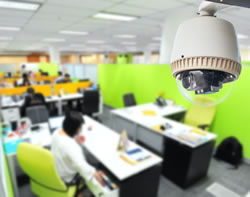Technology has resulted in a huge increase in employee surveillance, but Lisa Earle McLeod says unless it is used for transparent reasons it can have a chilling effect on the workforce.
 How many emails did you send this week? Did you swipe your badge, proving you went into the office today?
How many emails did you send this week? Did you swipe your badge, proving you went into the office today?
As it becomes increasingly easy to track our behaviour (via our digital footprints) employers are capitalising on the information.
According to the Harvard Business Review, in 2020 the global demand for employee monitoring software more than doubled.
Online searches for “how to monitor employees working from home” increased by 1,705 per cent.
Sales for systems that track workers’ activity via desktop monitoring, keystroke tracking, video surveillance, GPS location tracking, and other digital tools are going through the roof.
As many organisations push for a return to the office, that same hyper-monitoring is now being applied to badge swipes and parking passes.
Tracking employees, digitally or physically, is kind of like snooping through your spouse’s phone. No matter what you find, if you feel the need to do it, there’s a problem.
So, some advice if you feel you’re being tracked:
Try not to take it personally: Employers don’t start tracking things because of their always-reliable superstar employees.
It’s the slackers that prompt the microscope, and the rest of the workforce has to deal with the fallout.
Know where your manager stands: Don’t make your manager pay the price for a tone-deaf overlord (their boss’ boss’ boss).
If your own manager thinks this whole keystroke thing is nonsense, then don’t let it impact your working relationship.
On the flip side, if they can’t wait to dive into your daily activity reports…well, now you know.
Stay honest: When COVID-19 first hit I saw a TikTok video of someone attaching their computer mouse to a robot vacuum cleaner to appear always online — funny and also sad.
If you are performing well and your boss is pleased, don’t die on the hill of ensuring your dot is green. It creates a cycle of stress and unrealistic expectations.
A reasonable employer will understand when you need to pick up a sick kid from school or talk to the plumber for a few minutes.
If they don’t, put your energy into finding a new job instead of bending to insane requirements.
However, if you are doing the tracking:
Examine your motives: Why do you want to track your employees? What are you hoping to find? Or what fears are you hoping to alleviate?
Just because the tools are available doesn’t mean you have to use them. The cost could be steep, and I’m not talking about your monthly fee to Big Brother.
Use a pencil, not a broad brush: If you have a small handful of troublesome employees, instituting keystroke tracking for your entire workforce will come back to bite you.
Employee surveillance efforts are often all-encompassing to seem ‘fair’, but asking trustworthy teammates to compensate for their less-than-stellar colleagues is anything but fair.
Don’t let your need to monitor low performers have a chilling effect on high performers.
Do something with your findings: Tracking can give you data, but tracking alone is not a solution.
Instead of doling out one-off wrist slaps, look for themes.
Is Friday the day when most employees skip the office? Does productivity slump at the start of the month? Are one team’s working habits sabotaging a section?
What do these findings enable you to do? How can you leverage the data to be a better employer, instead of a more detailed disciplinarian?
Without action, tracking costs you employee trust and gives you absolutely nothing in return.
Finding out someone snooped through your phone makes you feel icky, even if you don’t have anything to hide, but here’s the thing: The snooper feels icky too.
Nobody wants their behaviour under a microscope, and most managers don’t want to peer through the lens, either.
Employee surveillance tools could theoretically help organisations find themes, glean insights, and leverage data to become a better place to work.
Sadly, I rarely see it play out like that. More often than not, hyper-surveillance undermines trust, sabotages engagement, and leaves all parties feeling the ick.
* Lisa Earle McLeod is the leadership expert best known for creating the popular business concept Noble Purpose. She is the author of Selling with Noble Purpose and Leading with Noble Purpose. She can be contacted at mcleodandmore.com.
This article first appeared on Lisa’s blogsite











